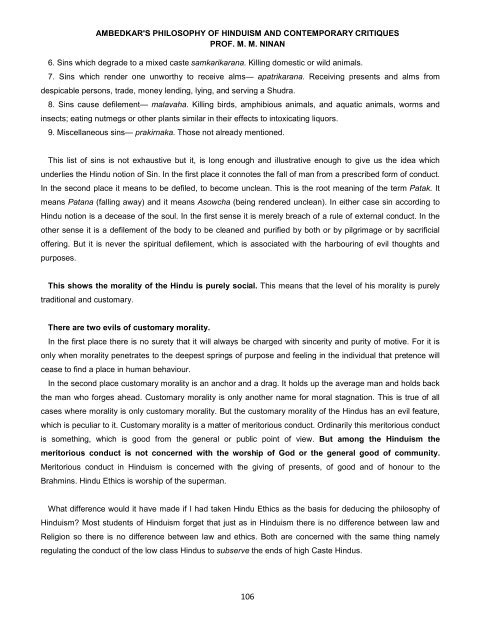Ambedkar-Philosophy of Hinduism
Create successful ePaper yourself
Turn your PDF publications into a flip-book with our unique Google optimized e-Paper software.
AMBEDKAR'S PHILOSOPHY OF HINDUISM AND CONTEMPORARY CRITIQUES<br />
PROF. M. M. NINAN<br />
6. Sins which degrade to a mixed caste samkarikarana. Killing domestic or wild animals.<br />
7. Sins which render one unworthy to receive alms— apatrikarana. Receiving presents and alms from<br />
despicable persons, trade, money lending, lying, and serving a Shudra.<br />
8. Sins cause defilement— malavaha. Killing birds, amphibious animals, and aquatic animals, worms and<br />
insects; eating nutmegs or other plants similar in their effects to intoxicating liquors.<br />
9. Miscellaneous sins— prakirnaka. Those not already mentioned.<br />
This list <strong>of</strong> sins is not exhaustive but it, is long enough and illustrative enough to give us the idea which<br />
underlies the Hindu notion <strong>of</strong> Sin. In the first place it connotes the fall <strong>of</strong> man from a prescribed form <strong>of</strong> conduct.<br />
In the second place it means to be defiled, to become unclean. This is the root meaning <strong>of</strong> the term Patak. It<br />
means Patana (falling away) and it means Asowcha (being rendered unclean). In either case sin according to<br />
Hindu notion is a decease <strong>of</strong> the soul. In the first sense it is merely breach <strong>of</strong> a rule <strong>of</strong> external conduct. In the<br />
other sense it is a defilement <strong>of</strong> the body to be cleaned and purified by both or by pilgrimage or by sacrificial<br />
<strong>of</strong>fering. But it is never the spiritual defilement, which is associated with the harbouring <strong>of</strong> evil thoughts and<br />
purposes.<br />
This shows the morality <strong>of</strong> the Hindu is purely social. This means that the level <strong>of</strong> his morality is purely<br />
traditional and customary.<br />
There are two evils <strong>of</strong> customary morality.<br />
In the first place there is no surety that it will always be charged with sincerity and purity <strong>of</strong> motive. For it is<br />
only when morality penetrates to the deepest springs <strong>of</strong> purpose and feeling in the individual that pretence will<br />
cease to find a place in human behaviour.<br />
In the second place customary morality is an anchor and a drag. It holds up the average man and holds back<br />
the man who forges ahead. Customary morality is only another name for moral stagnation. This is true <strong>of</strong> all<br />
cases where morality is only customary morality. But the customary morality <strong>of</strong> the Hindus has an evil feature,<br />
which is peculiar to it. Customary morality is a matter <strong>of</strong> meritorious conduct. Ordinarily this meritorious conduct<br />
is something, which is good from the general or public point <strong>of</strong> view. But among the <strong>Hinduism</strong> the<br />
meritorious conduct is not concerned with the worship <strong>of</strong> God or the general good <strong>of</strong> community.<br />
Meritorious conduct in <strong>Hinduism</strong> is concerned with the giving <strong>of</strong> presents, <strong>of</strong> good and <strong>of</strong> honour to the<br />
Brahmins. Hindu Ethics is worship <strong>of</strong> the superman.<br />
What difference would it have made if I had taken Hindu Ethics as the basis for deducing the philosophy <strong>of</strong><br />
<strong>Hinduism</strong>? Most students <strong>of</strong> <strong>Hinduism</strong> forget that just as in <strong>Hinduism</strong> there is no difference between law and<br />
Religion so there is no difference between law and ethics. Both are concerned with the same thing namely<br />
regulating the conduct <strong>of</strong> the low class Hindus to subserve the ends <strong>of</strong> high Caste Hindus.<br />
106


















